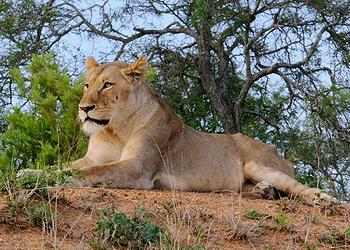
CAPE TOWN, South Africa, January 10, 2019 (ENS) – South Africa’s new Minister of Environmental Affairs Nomvula Mokonyane says the agency will appoint a high-level panel to review policies and legislation on matters related to elephant, lion, leopard and rhinoceros handling, management, breeding, hunting and trade.
One of the panel’s mandates pertains to the captive lion breeding industry, and a need to “harmonise sustainable use with strictly controlled legal international trade and monitoring.”

The confirmation of this high-level panel appointment comes on the back of then Acting Minister Derek Hanekom’s announced intent to establish this panel in response to a report tabled by the Parliamentary Portfolio Committee on Environmental Affairs, PPCEA, after a two-day Colloquium on Captive Lion Breeding for Hunting in August and the subsequent release of its report in November.
The report called for a policy and legislative review of captive breeding of lions for trophy hunting and the lion bone trade with a “view of putting an end to this practice.”
The Committee’s Chairman Mohlopi Mapulane said, “It seems as if South Africa’s conservation reputation is being compromised by this practice which does not seem to benefit broader conservation but a small number of breeders without proper scientific or conservation basis.”
Humane Society International-Africa’s Wildlife Director, Audrey Delsink, said, “The Department is out of sync with the Resolutions of the PPCEA, the South African public and even the trophy hunting industry in its continued propping up of the captive lion industry. We urge the Department to shut down this unethical industry profiting from animal cruelty, bogus medicinal tonics made from lion bones, and tourist scams.”
A nationwide survey of South African citizens revealed an overwhelming public concern about the captive lion breeding industry, with a vast majority agreeing it is harmful to the country’s international reputation.

A report from the South African Institute of International Affairs, commissioned by Humane Society International, states that the revenues generated by the lion cub petting and lion walking tourist attractions, while highly lucrative for these businesses, constitute only 1.85 percent of South Africa’s overall tourism industry, which is one of the biggest employers in the country.
The high level panel will conduct public hearings, draft submissions, consider scientific evidence and other forms of information that will enable the evaluation and assessment of current practices, regulatory measures and policy positions.
The panel will identify gaps, seek to understand and make recommendations on the basis of the subject matter.
The panel will also review the implementation of the recommendations of the Committee of Inquiry into the feasibility, or not, of a legal rhino horn trade, and any future decision affecting trade-related proposals to the Convention on International Trade in Endangered Species, CITES, which holds its next meeting in Colombo, Sri Lanka, May 23 to June 3.

South Africa’s Department of Environmental Affairs has for years dealt with a number of emotive and complex conservation and sustainability issues, particularly those involving iconic species. These include elephant management, the ivory stockpile, trade in rhino horn and the emerging issue of the lion bone trade.
The mandate of the department is to ensure the right to the protection of the environment, for present and future generations, reasonable legislative and other measures that secure ecologically sustainable development and the use of natural resources while promoting justifiable economic and social development, Mokonyane said.
“Taking into account the current compliance inspections of lion captive breeding facilities being conducted throughout the country, there is a need to harmonize sustainable use with strictly controlled legal international trade and monitoring,” she said.
Minister Mokonyane has amended the 2018 lion bone export quota to 800 skeletons from 1,500 skeletons announced in June 2018. The pull-back is in line with the report of the Parliamentary Portfolio Committee on Environmental Affairs, a decision the committee said was “informed by commercial considerations, as opposed to science.”
The new quota is the same as the allocation for 2017. The maintenance of the 2017 quota will allow the Department to reflect on effectiveness of the implementation of the quota, enhance compliance and monitoring systems, and further allow the high-level panel being appointed to incorporate these issues into their work.

The African lion, Panthera leo, is included in Appendix II to CITES, which means live lions and lion parts can be traded internationally only under strict regulation.
South Africa is one of only seven countries in the world that has substantial lion populations. According to the Non-Detrimental Finding for Panthera Leo made by the Scientific Authority and gazetted in January this year, there are 3,500 African lions in the wild in South Africa, with no major threats to South Africa’s wild lion population.
In addition, approximately 7,000 lions are kept in around 260 captive breeding facilities in South Africa. Lion are bred in captivity for various reasons; including hunting but also as a potential source for the establishment of new lion populations. Some are sold to start new conservation areas while others are donated to countries whose own lions have long become extinct.
In 2018, the U.S. pro-trophy hunting group Safari Club International announced it will no longer allow the promotion or auctioning of hunts involving African lions bred and shot in captivity saying that canned hunting “has doubtful value to the conservation of lions in the wild.”
Other hunting organizations also have spoken out against trophy hunting of captive-bred lions including the Dallas Safari Club, Boone and Crockett Club, Operators and Professional Hunter Associations of Africa and Namibia Professional Hunters Association.
Copyright Environment News Service (ENS) 2019. All rights reserved.
